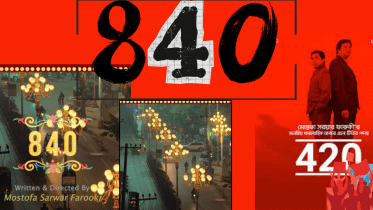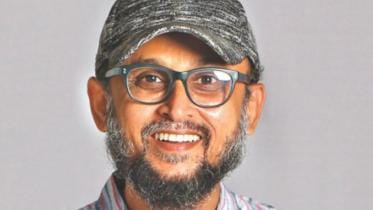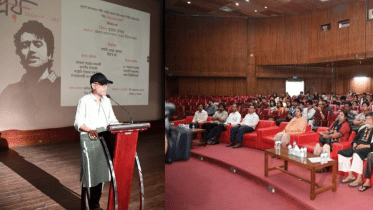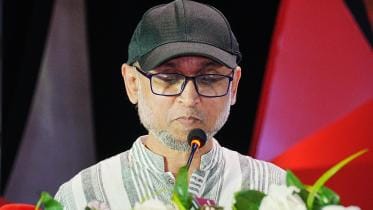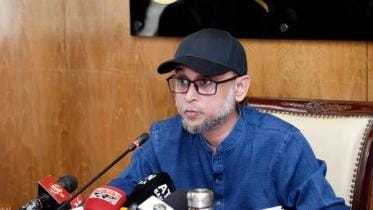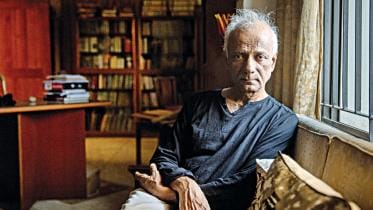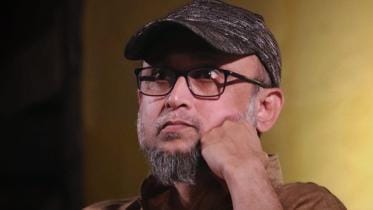Mostofa Sarwar Farooki
Mostofa Sarwar Farooki's political satire '840' lands on iScreen
"840" features a stellar cast, led by Nasir Uddin Khan in the central role. He is joined by other acclaimed actors including Marzuk Russell, Fazlur Rahman Babu, Zakia Bari Momo, Shahriar Nazim Joy, and Zayed Khan. The production also shines a light on local talents, featuring actors from the Rajshahi and Naogaon regions.
14 September 2025, 07:07 AM
Farooki welcomes move to honour Lalon, calls for wider cultural recognition
Filmmaker and Cultural Adviser Mostofa Sarwar Farooki has praised the government’s decision to elevate Lalon Shah’s death anniversary to a “Category A” national day, calling it the first step towards dismantling a long history of intellectual colonisation.
28 August 2025, 08:39 AM
Farooki undergoes successful appendix surgery
Cultural adviser and filmmaker Mostofa Sarwar Farooki fell ill on Saturday evening while attending an official programme in Cox’s Bazar.
17 August 2025, 17:40 PM
Cultural adviser now under medical supervision, remains out of danger
Filmmaker and Cultural Adviser Mostofa Sarwar Farooki is undergoing treatment at a hospital in Dhaka after falling sick during an official visit to Cox’s Bazar. His wife, actress Nusrat Imrose Tisha, confirmed the development on social media yesterday, saying he had become ill while attending a ministry workshop. Doctors later stated that he had fallen sick due to excessive work pressure but is now out of danger. “Please keep him in your prayers,” she wrote.
17 August 2025, 04:37 AM
11 individuals will travel to China to learn drone operations
To help Bangladeshi youth learn the art of drone programming from China, a specialised training programme has been launched as a joint initiative between the Chinese Embassy and Bangladesh’s Ministry of Cultural Affairs. As part of this programme, 11 individuals have been selected to travel to China — nine as trainees, one as team leader, and one official.
13 August 2025, 14:42 PM
Efforts underway to share the tale of July Uprising: Mostofa Sarwar Farooki
Cultural Affairs Adviser Mostofa Sarwar Farooki has said that efforts are underway to widely disseminate the tragic and powerful story of the July 2024 mass uprising to the public through collective and narrative-driven projects.
27 July 2025, 07:02 AM
Drone show and cultural programme held at Central Shaheed Minar to mark July Uprising
To commemorate the historic July Uprising, the Ministry of Cultural Affairs, in collaboration with the Bangladesh Shilpakala Academy, has organised a month-long series of programmes aimed at reviving the spirit of the movement. As part of the initiative, a special event was held yesterday (July 14) at the Central Shaheed Minar, featuring a cultural programme and a musical drone show.
15 July 2025, 04:37 AM
Shilpakala Academy to host ‘Ananda Utsab’ this Eid
Marking the occasion of Eid-ul-Azha, Bangladesh Shilpakala Academy is set to host “Ananda Utsab” at the Nandan Mancha of the academy. Supported by the Ministry of Cultural Affairs, the programme will take place on Friday, 6 June, at 7pm.
5 June 2025, 09:43 AM
Farooki reflects on an uplifting day in Cumilla honouring Nazrul
Acclaimed filmmaker and Cultural Adviser Mostofa Sarwar Farooki today shared a heartfelt note on Facebook following a vibrant cultural event in Cumilla, describing it as "a day filled with positive energy, insightful discussions, and uplifting words."
25 May 2025, 16:16 PM
Bengal Symphony to represent Bangladesh at Osaka Expo 2025
Celebrated composer and singer Emon Chowdhury and his band Bengal Symphony are all set to represent Bangladesh at the Osaka Expo 2025
7 May 2025, 13:16 PM
Case against Iresh 'deeply troubling, deeply disturbing': Farooki
A murder case was filed against Iresh and 407 others, including ousted prime minister Sheikh Hasina
28 April 2025, 09:01 AM
Anondo Shobhajatra not politically motivated: Farooki
Cultural affairs adviser Mostofa Sarwar Farooki has said this year’s Anondo Shobhajatra was not politically motivated.
14 April 2025, 05:43 AM
‘Cultural healing’ and ‘inclusivity’ key in Bengali New Year celebrations as Ministry announces plans
Farooki declared that this year’s New Year celebrations would bring together not just Bengali citizens, but also 27 ethnic communities from across the country. “Diversity is our most powerful and beautiful asset,” he said.
9 April 2025, 11:20 AM
Shilpakala is not without leadership: Mostofa Sarwar Farooki
Renowned filmmaker and cultural affairs adviser Mostofa Sarwar Farooki has dismissed concerns that Bangladesh Shilpakala Academy is running without leadership following the recent resignation of its Director General, Syed Jamil Ahmed.
9 April 2025, 09:14 AM
Syed Jamil Ahmed clarifies his stance on stepping down from Shilpakala
As the ongoing allegations, contentions and discussions were addressed by the Cultural Advisor Mostafa Sarwar Farooki through his Facebook posts and the Ministry of Cultural Affairs through a press note, Syed Jamil Ahmed clears his stance once again in an interview.
3 March 2025, 13:19 PM
Farooki is fine as an adviser, at least he’s not being childish: Prince Mahmud
Popular music composer Prince Mahmud has opened up about the issue. On Monday, March 3, Prince Mahmud wrote on Facebook, “Mostofa Sarwar Farooki is fine as an adviser. At least he is not being childish. He is sensitive and knows what to say and do in different situations. The situation demands someone like him.”
3 March 2025, 11:12 AM
Farooki questions Syed Jamil’s claims
Cultural Affairs Adviser Mostofa Sarwar Farooki has questioned some of the issues raised by Syed Jamil Ahmed in his statement while handing his resignation as the director general of Bangladesh Shilpakala Academy at a public event.
1 March 2025, 18:00 PM
Farooki sheds light on closure of theatre festival
Quick probe finds rift between theatre artistes
16 February 2025, 09:09 AM
8 cultural personalities who will be conferred with the Ekushey Padak
Among the recipients are late novelist Shahidul Zahir (Md Shahidul Haque) and poet Helal Hafeez, who will be honoured posthumously for their contributions to Language and Literature. Renowned photographer and founder of Drik Gallery and Pathshala South Asian Media Institute, Shahidul Alam, will receive the award for his work in Culture and Education. Filmmaker Azizur Rahman, famed for his work on “Chhutir Ghonta”, will be conferred the award posthumously for his contributions to Arts (Cinema), while Ustad Nirad Baran Barua and Ferdous Ara will be honored for Music. Nasir Ali Mamun will be recognized for Arts (Photography), and Rokeya Sultana will receive the award for Arts (Fine Arts).
6 February 2025, 13:01 PM
Bring culture and tourism ministries under one umbrella: Farooki
Mostofa Sarwar Farooki, adviser to the Ministry of Cultural Affairs, has called for merging the culture and tourism ministries to ensure better coordination.
30 January 2025, 05:30 AM
